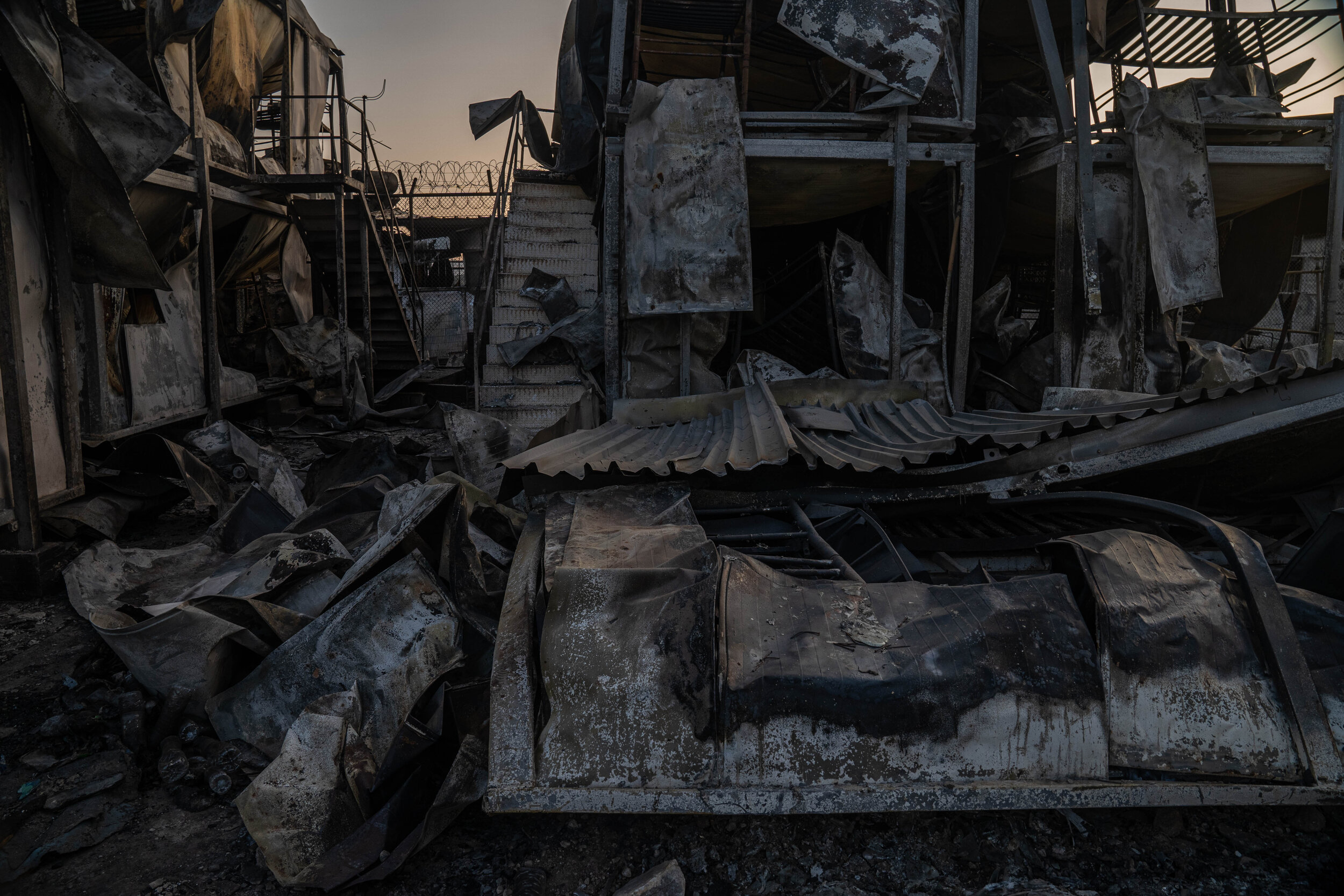
GHOSTS OF MORIA
“Surviving in the ashes of Europe’s biggest refugee camp”
In September, Moria, the largest refugee camp in Europe, burned down on the Greek Island of Lesbos, displacing thousands of people. In the ashes and rubble that remain, a group of refugees is trying to survive by scavenging for metal.
We meet Khalil and Ayham in the burnt-out Moria refugee camp on the island of Lesbos in Greece. They are rooting about, pulling copper cords from wiring boxes, their clothing greased from the soot, ashes, oil and smoke. Their palms are black and gouged from the shards they collect from morning till evening in the metal graveyard.
They live alone in the gutted Moria camp. In the midst of starving cats, squeaking rats and the heavy stench of decayed garbage, they have set up a tent and survive by scavenging metal. In these apocalyptic surroundings their paths have crossed for a time, and a unique friendship has been born of shared suffering. Both are from Aleppo; both were wounded in a rocket attack; both fled the brutal civil war in Syria; and now both are homeless again after Europe’s largest refugee camp burned to the ground.
Though their bodies carry the scars of war, their asylum requests have been rejected. While waiting in this bureaucratic limbo, they attempt to sustain a quotidian routine in a sinister place. Khalil is the master chef and brags that he can cook 225 different Turkish and Syrian dishes. He prepares all their meals at the bonfire in front of their tent, while Ayham is light-hearted, joking around and idle like an annoying little brother.
Khalil’s family live in extreme poverty in Turkey and he feels obligated to support them with the little money he makes from selling the metal to the corrupt, local scrap dealer. He wants to leave Lesbos and plans to sneak onboard the only ship leaving the island. Ayham wants to remain on the island and help other refugees. Both plans seem hopeless.
They are also in a race against the clock. Every day the camp is stripped by Roma people filling their cars to the brink with metal, while Greek authorities clear the camp with excavators, trucks and cranes, leaving Khalil and Ayham frustrated and desperate. When there is no more copper left, they gather aluminum, which fetches a lower price. Soon there will be no more of that left either, and they will move on to iron, which is worth even less. At the same time, they have to hide from the police that patrol the camp and, at one point, raid their tent to interrogate them.
“The Ghosts of Moria” is a story from one location, the burnt-out Moria camp. It’s a universal story about how to survive in a post-apocalyptic universe, where human warmth and friendship are as precious as copper wiring—and as rare.
Background on Moria and published article by the filmmakers
Moria camp has been Europe’s largest refugee camp since 2015. It has become a symbol of a fractured EU policy and failed migration collaboration between European nations. Around 13.000 people lived in the camp under miserable sanitary conditions, when it burned down in September this year. This fall, EU proclaimed that all refugees and migrants would be moved from Lesbos before Easter 2021. Instead, detention centers will be established to house new asylum seekers in mainland Greece.
https://www.aljazeera.com/features/2020/12/29/surviving-in-the-ruins-of-moria
About the directors
Michael Graversen is a non-fiction writer, activist and multi award winning Danish documentary filmmaker, whose films have won awards and been selected for such festivals as IDFA and CPH:DOX. He graduated from the National Film and Television School in England and directs documentaries often of an existential or socially relevant character.
Florian Elabdi is a journalist focusing on Europe, the Middle East and Africa who writes and produces documentaries and written journalism for a large number of Danish and international media reporting on everything from the war against IS in Iraq to returning foreign fighters in Tunisia. From Russia's political comeback in Central Africa to Hezbollah's influence in the Syrian war. And from the activism of young Muslims during the Danish parliamentary elections to the new wave of protest movements in the Arab world.
PROJECT
Title: The Ghosts of Moria
Director: Michael Graversen and Florian Elabdi
Producer: Michael Graversen - Graversen Film
Co-producer: Jesper Jack - House of Real
Executive Producer: Jesper Jack
Executive Producers for The Guardian: Lindsay Poulton, Ekaterina Ochagavia & Annie Kelly
Sound: Raoul Brand
Editor: Mikael K Ebbesen
Composer: Sune Køter Kolster
Grade: Anders Vadgaard Christensen / Kong Gulerod
Duration: 25
Platforms: Film, editorial, photo exhibition and digital
Outreach: Mellemfolkelig Samvirke, Action Aid Denmark
Delivery: 2022
STATUS: World Premiere / Clermont-Ferrand 2022







